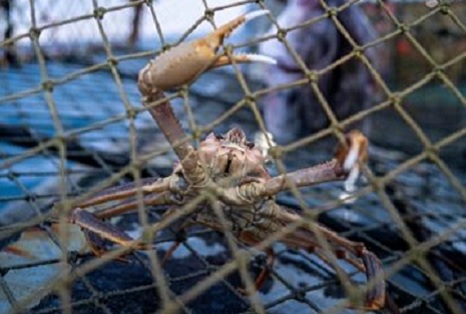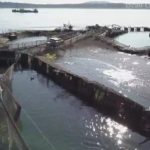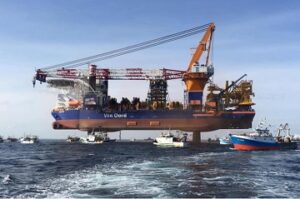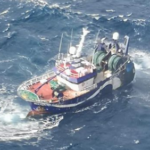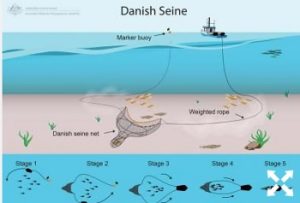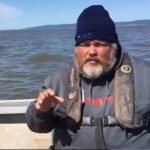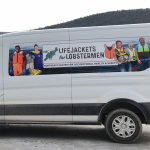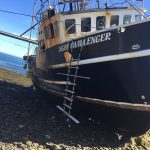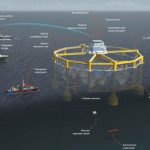Tag Archives: Public Employees for Environmental Responsibility

NMFS survey delivers more bad news to Bering Sea crab fleet
A Bering Sea survey by federal scientists contains more bad news for Alaska, Washington and Oregon-based crabbers hoping for an upturn in upcoming harvests that last year fell to rock-bottom levels. The federal survey results for Bristol Bay king crab are bleak and crabbers have been warned that for a second consecutive year there may not be a fall harvest, according to Jamie Goen, executive director of the Alaska Bering Sea Crabbers. “We have got an emergency,” Goen said. “I’m trying to get Congress to act to help.” The National Marine Fisheries Service survey does offer hope for improved harvests three to five years from now, as young snow crabs grow to adult size. >click to read< 12:20
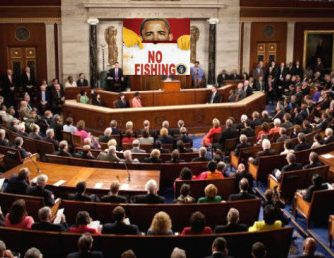
President Biden’s flurry of actions to protect the environment reignites a controversy about the Atlantic’s only marine monument
Last June, as part of a concerted campaign to dismantle the environmental policies of the Obama administration, Donald Trump met with fishermen in Maine and signed a proclamation that allowed commercial fishing in nearly 5,000 square miles of federally protected waters southeast of Cape Cod. In all, Biden ordered federal agencies to begin reviewing and restoring more than 100 environmental regulations that were dismantled or weakened by the Trump administration. While many of Biden’s orders could have a significant impact on New England, the review of the (Northeast Canyons and Seamounts) marine monument, a Connecticut-sized area that lies about 130 miles southeast of Provincetown, has stirred immediate controversy. >click to read< 11:44
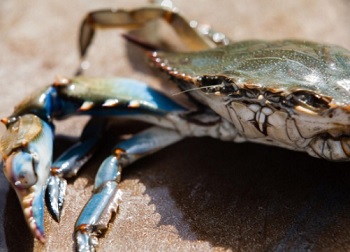
‘Forever chemicals’ found in Chesapeake seafood and Maryland drinking water
More testing has found so-called “forever chemicals” in a striped bass, blue crab and oyster from the Chesapeake Bay,,, Eleven different PFAS compounds were also detected in tap water sampled from three homes in Montgomery County,,, PFAS are a group of more than 8,000 chemical compounds used in nonstick cookware, flame retardants, water-repellant and stain-resistant clothing and furniture, as well as in fire-fighting foams used at airports and military bases. They do not break down in the environment. They also spread easily through water and can build up in animals or organisms that ingest them, including people. >click to read< 18:04
Assaults on Fisheries Observers More than Double in Two Years with No Reported Enforcement
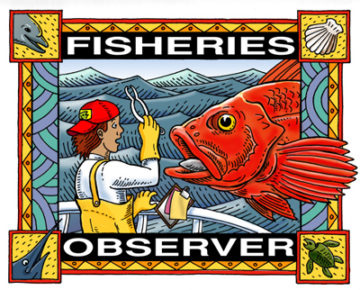 Attacks against independent monitors of U.S. fishing fleets more than doubled between 2013 and 2015. That’s according to official figures posted today by the Association for Professional Observers (APO) and Public Employees for Environmental Responsibility (PEER). Last year, despite a record number of such assaults, the National Oceanic & Atmospheric Administration (NOAA) took no enforcement action in any case and more than half remain in “open” status – many for months. Approximately 700 observers monitor fleets in 47 different fisheries in U.S. waters, logging some 77,000 days at sea each year. Many are female and face particular challenges from all-male fishing crews on long voyages. Read the rest here 22:22
Attacks against independent monitors of U.S. fishing fleets more than doubled between 2013 and 2015. That’s according to official figures posted today by the Association for Professional Observers (APO) and Public Employees for Environmental Responsibility (PEER). Last year, despite a record number of such assaults, the National Oceanic & Atmospheric Administration (NOAA) took no enforcement action in any case and more than half remain in “open” status – many for months. Approximately 700 observers monitor fleets in 47 different fisheries in U.S. waters, logging some 77,000 days at sea each year. Many are female and face particular challenges from all-male fishing crews on long voyages. Read the rest here 22:22
PEER urges Obama to unilaterally create national marine monuments
 The announcement by PEER came hours before the president was scheduled to arrive in Alaska, with environmental groups accusing him of hypocrisy for allowing oil drilling in the U.S. Arctic Ocean while simultaneously pushing for reduced global greenhouse gas emissions. Public Employees for Environmental Responsibility announced Monday that more than 100,000 people had signed an online petition requesting that Obama use his executive powers to create marine monuments in Alaska to help protect iconic Alaska animals such as polar bears, and public servants,,, Red the rest here 22:06
The announcement by PEER came hours before the president was scheduled to arrive in Alaska, with environmental groups accusing him of hypocrisy for allowing oil drilling in the U.S. Arctic Ocean while simultaneously pushing for reduced global greenhouse gas emissions. Public Employees for Environmental Responsibility announced Monday that more than 100,000 people had signed an online petition requesting that Obama use his executive powers to create marine monuments in Alaska to help protect iconic Alaska animals such as polar bears, and public servants,,, Red the rest here 22:06
Hands off the Aleutian Islands
 Public Employees for Environmental Responsibility submitted a nomination to the National Oceanic and Atmospheric Administration for a marine sanctuary around the islands in December. It is supported by environmental groups, including some in Alaska, according to Alaska Sen. Lisa Murkowski. While that could take a long while, the environmental groups are hoping to draw this proposal to President Obama’s attention — undoubtedly hoping for a national monument designation. Read the rest here 10:53
Public Employees for Environmental Responsibility submitted a nomination to the National Oceanic and Atmospheric Administration for a marine sanctuary around the islands in December. It is supported by environmental groups, including some in Alaska, according to Alaska Sen. Lisa Murkowski. While that could take a long while, the environmental groups are hoping to draw this proposal to President Obama’s attention — undoubtedly hoping for a national monument designation. Read the rest here 10:53
Canada’s Science Library Closures Mirror Bush’s Playbook
 Reporting by The Tyee, prompted by tips from U.S. readers, found that a similar scenario unfolded in the United States during the administration of George W Bush Jr. Familiar claims To ostensibly save $2-million dollars a year (a drop in the bucket for the EPA’s $8-billion budget) the Bush administration closed five regional libraries serving 15 states and reduced access to libraries serving another 15 states in 2006. Read more@thetyee 10:18
Reporting by The Tyee, prompted by tips from U.S. readers, found that a similar scenario unfolded in the United States during the administration of George W Bush Jr. Familiar claims To ostensibly save $2-million dollars a year (a drop in the bucket for the EPA’s $8-billion budget) the Bush administration closed five regional libraries serving 15 states and reduced access to libraries serving another 15 states in 2006. Read more@thetyee 10:18
PEER says electronic monitoring progress still dry-docked – Fishing fleet compliance? or Public Employee Job Security!
![]() “Cost effective electronic systems that meet both regulatory and scientific demands are nowhere near deployment,” said Jeff Ruch, executive director of PEER, a national non-profit alliance of local, state and federal scientists, and others dedicated to upholding environmental laws and values. “Grafting 21st century technology onto the decks of an 18th century industry is no simple task.” more@cordobatimes 16:06
“Cost effective electronic systems that meet both regulatory and scientific demands are nowhere near deployment,” said Jeff Ruch, executive director of PEER, a national non-profit alliance of local, state and federal scientists, and others dedicated to upholding environmental laws and values. “Grafting 21st century technology onto the decks of an 18th century industry is no simple task.” more@cordobatimes 16:06
Progress of Electronic Monitoring Program Scrutinized
Eco-Lawsuit Advances against Cape Wind Risk to Right Whale and other Threatened and Endangered Species Litigated
NOTE. Links will be added as they become available. http://www.milforddailynews.com/news/x493268917/Suit-claims-Cape-Wind-violates-endangered-species-law
Hyannis, Mass. (October 10, 2012) – Public Employees for Environmental Responsibility (PEER), the Alliance to Protect Nantucket Sound and other conservation groups today filed a brief in U.S. District Court for the District of Columbia detailing Cape Wind’s numerous violations of federal protections for threatened and endangered species – including the imperiled North Atlantic right whale, one of the rarest mammals in the world. This suit charges the project violates three key federal laws – the Endangered Species Act, the Migratory Bird Treaty Act and the National Environmental Policy Act.
Other plaintiffs include the Cetacean Society International, Lower Laguna Madre Foundation, Californians for Renewable Energy, and Three Bays Preservation. This is one of five federal lawsuits facing Cape Wind, a massive industrial project proposed to cover 25 square miles of Nantucket Sound with an array of 130 massive turbines – each stretching taller than the Statue of Liberty.
Today’s brief explains how the mega-project poses serious risks to the right whale, four species of federally-protected sea turtles and several species of migratory birds. It also criticizes the lack of oversight and analysis of the impact of Cape Wind on this critical habitat.






